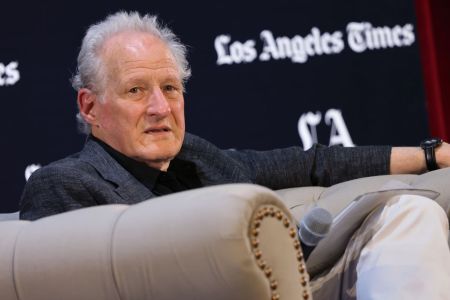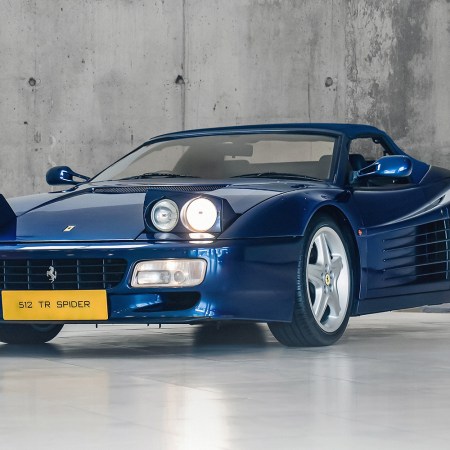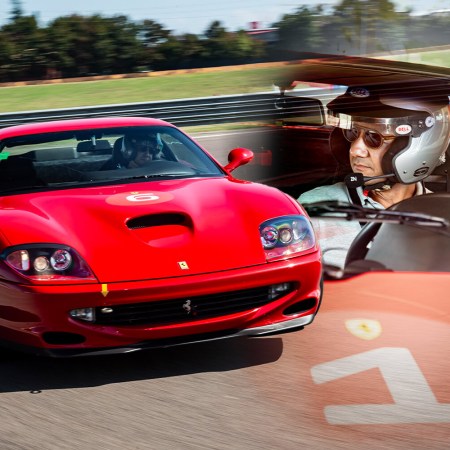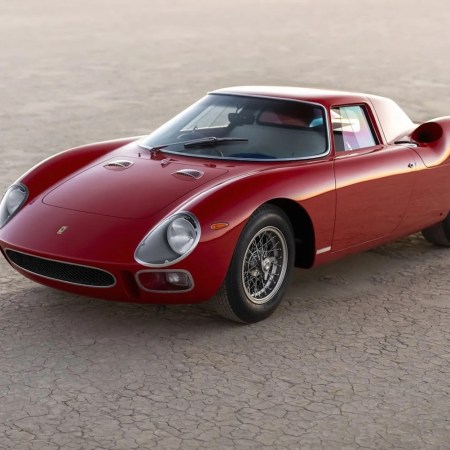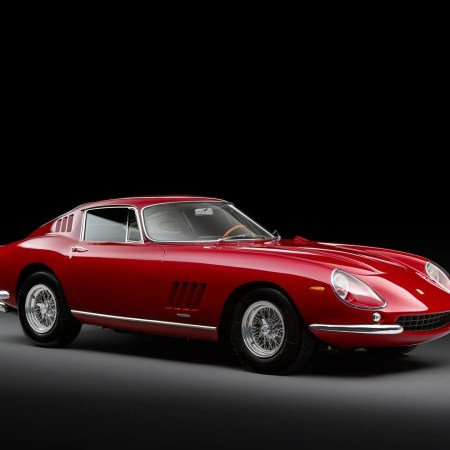Those outside of film-geek circles could be forgiven for assuming that director Michael Mann has passed the peak of his esteem. Since his glory days releasing Oscar-nominated movies like The Insider and Ali and his biggest-ever hit Collateral, Mann has made one expensive flop (Miami Vice), one expensive even-bigger flop (Blackhat) and a hit widely seen as a disappointment (Public Enemies). Gaps between Mann movies have grown bigger, maybe owing to a difficulty securing funding for his big-budget passion projects. Whatever the reasons, his new movie Ferrari, which recently played the New York Film Festival after a gestation period so long that its credited screenwriter has been dead for 14 years, is an indie release after decades of big-studio work.
If you venture into those aforementioned geeky circles, however, you’ll find that Mann appears to be as venerated as ever, maybe even more so. In certain corners of Film Twitter, 2006’s Miami Vice isn’t a mumbly big-budget obfuscation of the same-named Mann-produced TV show; it’s an eminently quotable masterpiece that turned the world into a fiend for mojitos. Blackhat isn’t a folly; it’s a misunderstood techno-thriller with an even-better director’s cut about to make its hotly anticipated debut on 4K Blu-ray. His early film Manhunter, the first movie to feature Hannibal Lecter, isn’t secondary to the more definitive Silence of the Lambs; it’s more or less its equal, maybe even better. In other words, the Mannheads articulate ideas that could sound poetic or insane, depending on your wavelength, just like the hero of a Michael Mann movie (especially a later-period one).
I know this because I am one, albeit a moderate by some standards (by which I mean that I’m still not crazy about Miami Vice). So I’m able to look internally when I ask, how did this happen? Sure, we all loved Heat back in 1995. (OK, this is not strictly true; the movie was a moderate hit that received a stunning zero Oscar nominations, and a few “is that it?” reviews disappointed by the fact that living legends Robert De Niro and Al Pacino only share one real scene together. But it was well-regarded; it was never Blackhat.) But Mann appreciation goes beyond love for his agreed-upon classics. It often feels like Mann’s mystique has only been built up during or even because of his years in what might look, to some, like a late-career wilderness. Maybe it’s the scarcity that makes his work look more sacred, even when it’s more compellingly strange (Blackhat) than successfully blending the operatic and the procedural (Heat). Or maybe his dedication to his favorite character types and themes — the taciturn professional struggling manfully to maintain his control — feels more singular in an increasingly compromised and homogenized U.S. cinema.
The latter explanation makes Ferrari almost too perfect a fit for this late-career, fan-provided renaissance, even though the movie itself takes a step or three away from his other recent films in subject matter and style. It is, for the first time since Ali, a Mann film that does not focus on crime or men with weapons, though we do see how potentially deadly a fast car can be (and, to be fair, one character does pull a gun, although it’s a woman this time). Structurally, it’s more akin to an Aaron Sorkin biopic, of all things, following a short period in the life of Enzo Ferrari (Adam Driver), founder of his namesake car company, which he runs out of dedication to racing, rather than the commercial sales that pay for this endeavor. It takes place over a number of weeks in 1957, but the movie, though not plot-heavy, makes it feel more like days. Ferrari’s company is in trouble, as is his marriage to Laura (Penélope Cruz), following the death of their son; Laura is just learning about Enzo’s long-term affair with Lina (Shailene Woodley), though she takes greater issue with Enzo and Lina having produced an additional Ferrari heir. Lina, meanwhile, understandably pressures Enzo to allow the young boy, Piero, to officially take his father’s name. On top of all this, Ferrari’s team must win the high-profile Mille Miglia road race in order to keep the company solvent.
Though Enzo Ferrari is undoubtedly a more towering figure than, say, the fictional tough-guy hacker at the center of Blackhat, Mann’s movie about him has a somewhat more reflective register than his other recent endeavors. That’s not to say his movies are all thoughtless motion. His heroes are often contemplative amidst their decisive actions; Driver’s Ferrari still stands apart from them. While he’s obviously and constantly conflicted, he becomes almost deadpan in his reactions to various crises swirling around him. This is Mann’s funniest movie in, well, maybe ever, give or take the way that decades of affection now colors our reaction to some of the more rococo or brusque touches in Heat.
Michael Mann’s Automotive Interests Go Far Beyond His Enzo Ferrari Biopic
Which apparently include racing motorcycles with Daniel Day-LewisIt’s also talkier and more domestic than some viewers, even some Mann acolytes, might expect. If some of his films resemble procedurals where the actual steps in the process become abstracted or obtuse in his telling, Ferrari makes more explicit than ever the fact that these processes are often constructed around a man’s sense of self, a way of attempting to impose order on his corner of the world. Mann makes clear that even an act as seemingly simple and commonplace as driving asks for an exertion of control subject to chaos via something as simple as bumps or debris in the road — and, as on the road, you need to deal with what’s in front of you first. Enzo Ferrari demonstrates this early in the film when he quietly leaves Lina and Piero’s home early in the morning, carefully pushing his car down the driveway to avoid making any noise, before climbing in and gunning it home. By the time we hear Enzo insisting “I must have complete control” regarding outside financial help in his company, he barely needs to say so. Of course he does.
Mann has exercised his complete control in his 21st-century films by pushing hard into digital cinematography; he was embracing digital before it was the standard, and even as it became more common, he seemed eager to capture its blurry edges, to showcase digital’s ability to capture night scenes without disguising the rough-hewn video-y look that so many directors have tried (and sometimes failed!) to hide. Though Mann isn’t shy about using digital in seemingly incongruous period settings — Public Enemies is a painterly marvel of the format’s expressive capabilities — Ferrari employs more restraint, and more daylight. Its beauty is less jagged, more traditional, though the climactic race has some of that later-period Mann abstraction, close-ups and speed without slowing down to explain the rules or specifics of the competition at hand.
These adjustments probably don’t have a single thing to do with Mann’s online fandom, at least not consciously; he seems about as unlikely as any contemporary filmmaker to so much as glance at social media. Ferrari does, however, inadvertently make their case for Mann as a stylist with depth, while avoiding the perils of having such a recognizable signature; namely self-parody, something Blackhat bravely risked (and for non-converts, succumbed to; I’m a fan). Some hardcore Mann-iacs may be disappointed by this development — that Ferrari doesn’t require the same level of pure vibing as some of the filmmaker’s less accessible efforts, that it doesn’t simmer toward violence with a backdrop of digital-world cityscapes. As impeccable as those vibes always are, Ferrari bridges Mann world and something more closely resembling ours. He turns brand-name vibes back into a man.
This article appeared in an InsideHook newsletter. Sign up for free to get more on travel, wellness, style, drinking, and culture.

